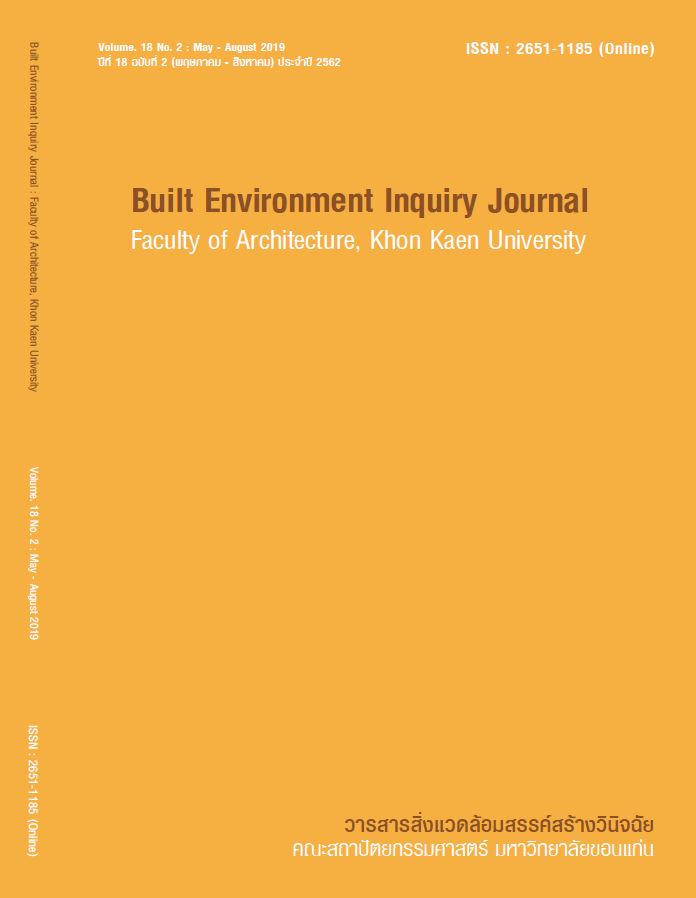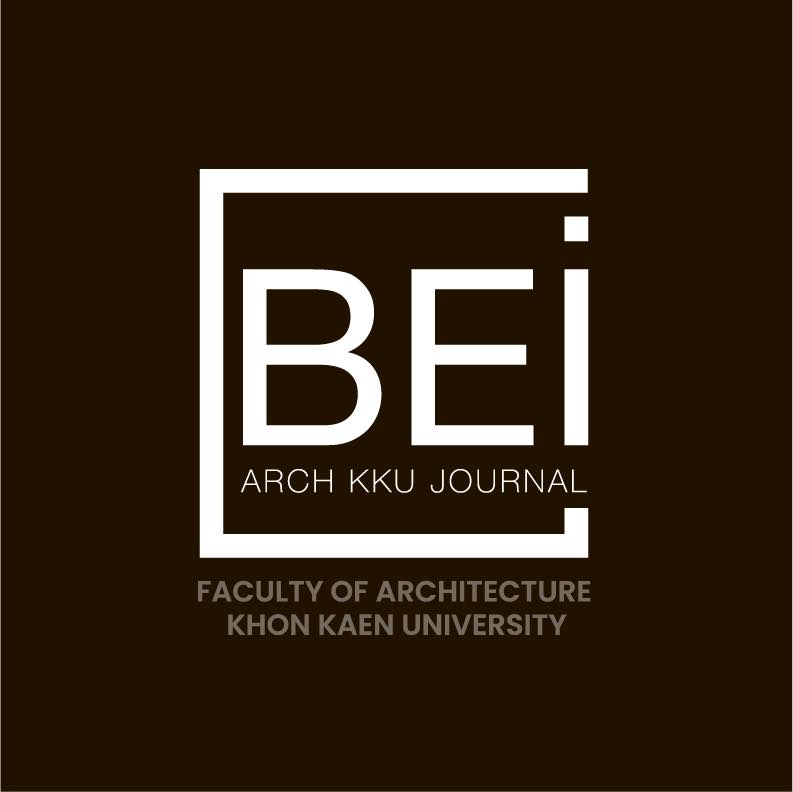การวิเคราะห์ความขัดแย้งและข้อพิพาทในโครงการก่อสร้างโดยใช้วิธีวิทยาคิว
DOI:
https://doi.org/10.14456/bei.2019.10คำสำคัญ:
ความขัดแย้ง, ข้อพิพาท, โครงการก่อสร้าง, วิธีวิทยาคิวบทคัดย่อ
บทความวิจัยนี้ คือ เรื่องการวิเคราะห์ความขัดแย้งและข้อพิพาทในโครงการก่อสร้างโดยใช้วิธีวิทยาคิว ซึ่งเกี่ยวข้องกับบุคคลหลายฝ่าย เช่น ผู้ว่าจ้าง ผู้รับจ้างเหมาก่อสร้าง ผู้ควบคุมงานก่อสร้าง และวิศวกรที่ปรึกษาทำหน้าที่ควบคุมงานก่อสร้าง เป็นต้น ทุกคนที่เกี่ยวข้องกับงานก่อสร้างไม่มีใครอยากให้มีปัญหาอุปสรรคเกิดขึ้นขณะที่ทำงานร่วมกัน เพราะอาจจะเป็นที่มาของข้อพิพาทและการโต้แย้งขึ้นได้ แต่ในความเป็นจริงแล้ว ปัญหาอุปสรรคย่อมเกิดขึ้นได้ จะมากน้อย รุนแรงเพียงใดขึ้นกับเหตุการณ์ สถานการณ์และสภาพของพื้นที่ทำงาน รวมทั้งวิธีการแก้ไขปัญหาร่วมกันและอาจส่งผลทำให้เกิดเป็นกรณีถกเถียงฟ้องร้องขึ้น วัตถุประสงค์หลักของงานวิจัยนี้เพื่อศึกษาปัญหาและปัจจัยที่ส่งผลต่อการเกิดความขัดแย้งและข้อพิพาทระหว่างผู้รับเหมากับเจ้าของโครงการก่อสร้าง จากนั้น ทำการวิเคราะห์และจัดกลุ่มปัจจัยที่ได้ ซึ่งจะนำไปสู่คำตอบในการลดปัญหาการเกิดข้อพิพาทในโครงการก่อสร้างลงได้ ขั้นตอนการวิเคราะห์ข้อมูลโดยเทคนิควิธีวิทยาคิว (Q-methodology) ถูกใช้เพื่อการวิเคราะห์จัดกลุ่มตัวแปรในงานวิจัย ผลลัพธ์ที่ได้จะนำไปสู่การสร้างกลยุทธ์ในการลดปัญหาการเกิดข้อพิพาทในโครงการก่อสร้างในประเทศไทย ประกอบด้วย (1) ด้านการเงิน (2) การขาดความรู้และประสบการณ์ (3) ความไม่ถูกต้องครบถ้วนของเอกสาร (4) ความบกพร่องในการทำงาน และ (5) งานไม่ได้คุณภาพตามที่กำหนด
เอกสารอ้างอิง
Barbosa, J.C., Willoughby, P., Rosenberg, C.A, & Mrtek, R.G. (1988). Statistical Methodology: VII. Q-Methodology, a Structural Analytic Approach to Medical Subjectivity. Academic Emergency Medicine, 5(10), 1032-1040.
Boscolo, P. & Cisotto, L. (1999). Instructional strategies for teaching to write: A q-sort analysis. Learning and Instruction, 9, 209-221.
Chang, S.O., Kim, J.H., Kong, E.S., Kim, C.G., Ahn, S.Y., & Cho, N.O. (2008). Exploring ego-integrity in old adults: A q-methodology study. International Journal of Nursing Studies, 45, 246-256.
Chinanuwatwong, S. (2014). witsawakam kānkō̜sāng læ kānčhatkān. (In Thai) [Construction engineering and management]. (5th ed.). Bangkok: Kasetsart University Press.
Chiradamkœng, W. (2010). kānbō̜rihān ngān witsawakam yōthā . (In Thai) [Civil engineering management]. Pathumthani: Wankawee.
Darkey, N., & Helmer, O. (1963). An Experimental Application of the Delphi Method to the Use of Experts. Management Science, 9(3), 458-467.
Grosswiler, P. (1992). Some methodological considerations on the use of multimedia Q-sample items. Operant Subjectivity, 15(3), 65–80.
Kakai, K. (2019). kānbō̜rihān khwāmkhatyǣng. (In Thai) [Conflict management]. Retrieved from http://www.novabizz.com/NovaAce/Relationship/Conflict_Management.htm
Kasetiam, W. (2015). kānsāng thīm ngān. (In Thai) [Building teamwork]. Bangkok: O.S. Printing.
Kotmaidotcom (2019). pramūan kotmāI phǣng læ phānit Māttrā Hārō̜ipǣtsipčhet. (In Thai) [Civil and commercial code 587]. Retrieved from http://www.kodmhai.com/m2/m2-4/m4-587-607.html
McKeown, B., & Thomas, D. (1988). Q Methodology. California, US: SAGE Publications, Inc.
Metkaruchit, M. (2016). thīm ngān: phalang thī sāng khwāmsamret. (In Thai) [Teamwork: power of success]. Bangkok: O.S. Printing.
Phichetthaphan, C.,& Kittipittayakorn, P. (2014). panhā nai kānkō̜sāng. (In Thai) [Problems in construction]. Nakhonratchasima: Deeprom Printing.
Phichetthaphan, C., Chaochudach, J. & Kittiphongphatthana, K. (2016). kānbō̜rihān sanyāčhāng thīprưksa ̄kānkō̜sāng. (In Thai) [Managing construction management agreement]. Nonthaburi: First offset (1993).
Phichetthaphan, C., Rattanachai, N., & Kittiphongphatthana, K. (2017). kānbō̜rihān khō̜rīakrō̜ng læ Khō̜phiphāt nai khrōngkānkō̜sāng. (In Thai) [Construction claim & dispute management]. Nonthaburi: First Offset (1993).
Pho-anukunbut, A. (2013). wičhai chœ̄ng khunnaphāp. (In Thai) [Qualitative research]. Bangkok: Kor-pon (1996).
Prasithrathsint, S. & Sookkaseme, K. (2007). nānā nawatakamma withīwitthaya ̄khio (Q Methodology) kānsưksā saphāwa čhittawisai chœ̄ng witthayāsāt: nǣokhit thritsadī læ kānprayukchai. (In Thai) [Varity of Innovative Research Methods Q Method: A Scientific Study of Subjectivity (Concepts, Theory and Application)]. Bangkok: Sarmlada Limited Partnership.
Teerasorn, S. (2009). nǣokhit phư̄nthān thāngkān wičhai. (In Thai) [Fundamental research concepts]. (2nd ed.). Bangkok: Chulalongkorn University Press.
Wikipedia, the free encyclopedia (2019). phū rapčhāng kō̜sāng. (In Thai) [Contractor]. Retrieved from https://th.wikipedia.org/wiki/ผู้รับจ้างก่อสร้าง
Witthayaudom, W. (2012). kānbō̜rihān khwāmkhatyǣng nai ʻongkō̜n [Organizational conflict management]. Bangkok: Thanathud Printing.
Yeun, E. (2005). Attitudes of elderly Korean patients toward death and dying: An application of Q-methodology. International Journal of Nursing Studies, 42, 871-880.
ดาวน์โหลด
เผยแพร่แล้ว
รูปแบบการอ้างอิง
ฉบับ
ประเภทบทความ
สัญญาอนุญาต
ทัศนะและข้อคิดเห็นของบทความที่ปรากฏในวารสารฉบับนี้เป็นของผู้เขียนแต่ละท่าน ไม่ถือว่าเป็นทัศนะและความรับผิดชอบของกองบรรณาธิการ




